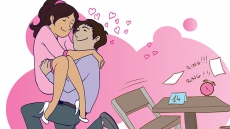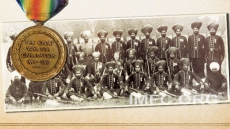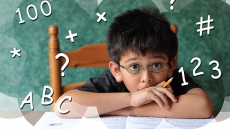How a hands-on approach is good for your health and healing
Our five senses are hard at work every day. The many sights, sounds, smells and tastes of the world around us are often discussed, debated or appreciated at great lengths. But what about touch?
A bump from a stranger on the sidewalk as they stride by too close. A high-five from a teammate for a job well done. A quick squeeze of the hand from a child who struggles with a moment of fright. These experiences all rely heavily on our sense of touch and yet the majority of these sensations aren't analyzed after their immediate interaction despite the many physical and emotional benefits associated with this tactile form of communication.
“Touch plays an important role in our ability to thrive, to love and be loved,” explains Angela Mattos, director of administration at Healing Touch Canada. The miraculous ways in which touch offers health and healing go much beyond a warm embrace or comforting kiss.
Touch is an important part of our lives from the moment we are born. The benefits of this intimate interaction can be seen in young babies who gain weight faster than those lacking skin-to-skin contact and develop their mental and motor skills at an exceptional rate. As most parents can attest, a simple touch can be essential to calm a crying baby.
Extensive research has shown the healing powers of physical contact. Through touch, cardiovascular stress can be calmed, allowing us to relax and reduce the strain placed on our cardiovascular systems. It improves pulmonary functions so our lungs can take in and release air with ease, improving the quality of our circul-atory systems. Therapeutic touch has been shown to lessen the symptoms of those suffering from dementia.
Studies have repeatedly reported decreased pain as a result of touch therapy. It can complement the recovery process after surgery. Touch deprivation can be detrimental to our health.
Massage therapy, a form of healing based on touch, promotes circulation and aids in the repairing of injured muscles. Massages aren't only important for the physical benefits they provide but also promote relaxation and reduced anxiety. While it may seem obvious that an hour of unwinding will lessen our stress, studies have shown massage therapy causes slower heart rates, decreases in blood pressure, and a drop in the stress hormone cortisol.

Scientifically speaking, relaxation can keep you healthier; cortisol suppresses the immune system so if an increase in relaxation decreases cortisol, a massage consequently boosts our immune response. Studies show similar effects can be seen from hugs and hand-holding. Our immune systems can function more effectively and our blood glucose levels show signs of decreasing when we are exposed to tactile contact.
“This type of connection supports us in being present to our emotions and can facilitate the release of cellular memory held in the body,” says Mattos, referencing the ability of touch to heal us emotionally.
Human touch is medicine for the mind. It has been shown to decrease depression and fatigue while improving moods and energy levels. In addition to the stress-reduction effects, touch is a form of communication delivering messages of compassion, love, gratitude and fear. It can signal safety and trust. A necessity to building and maintaining healthy relationships, touch allows us to make emotional connections different
than those made by the other senses.
“When we feel supported and accepted without being judged, emotional healing begins,” says Mattos. “When contact is made with the intention to connect from a heart centred place (a place of genuine compassion) there is an opportunity to break through many of our usual defenses, establishing trust and conveying a sense of unity. This has the potential to affect our physical, mental, emotional
and spiritual well-being.”
Beyond many of the obvious gains made through touch, studies have shown several surprising perks to physical contact. NBA teams in contact with each other more win, more games. Students who receive a light, friendly pat from a teacher are more likely to speak up in class. Patients with complex diseases who have received a pat on the back from their doctor are believed to have a higher survival rate.
By the time children reach their teenage years, they receive only half as much human contact as they did in the beginning stages of their lives. With it playing such an important role in our health, the diminishing amount of touch we receive as adults can be concerning. Sharing a hug, high five or hand-shake might be worth more to your neighbour than you know.





